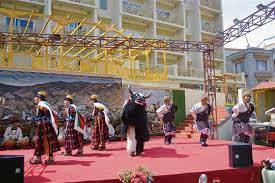LEH: Beyond the tumult and chaos of cities, crisp breeze wafts the scent of apricot through spectacular arid highlands where the Zanskar river meets the Indus. It is a place nestled in the Himalayas and Karakoram ranges, the land of high passes and monasteries Ladakh.
Often considered an idyllic retreat, Ladakh’s Leh, perched at a height of around 11,500 feet, witnessed a whirlwind of activity in April, albeit without losing its composure.
Under India’s G20 presidency, Leh was chosen as a venue for the Y20 pre-summit in which over 100 youth delegates from 30 nations participated. Since its formation as a union territory, it was Ladakh’s first major international event amid sporadic confrontations between the Indian and Chinese militaries along the LAC.
Even as geopolitical tensions persist, the Centre pulled out all the stops to make the occasion a grand success. The forum offered the promising delegates from G20 nations a chance to share their ideas on five board thematic areas climate change, youth in democracy, peace-building, industry and innovation, and health and well-being while also giving them an insight into the rich culture of Ladakh through visits to various monasteries and museums.
Ladakh’s greatest asset, besides its deeply anchored inhabitants, is its pristine environment. While its awe-inspiring landscapes and deep blue waters continue to attract visitors from far and wide, Ladakh seems to be torn between promoting tourism and saving its ecology.
At Y20, one of the major areas of discussion was climate change and justice, something which concerns not just the region but the world entire. In line with the Centre’s vision of a carbon-neutral Ladakh, e-buses were pressed into service for the delegates.
Food choices and climate change
Great efforts have been made and discussions held during international climate conferences, such as COP27 held in Egypt last year, on what nations can do to mitigate climate change. The elephant in the room has, however, remained largely unaddressed.
A study published in Nature Food in recent years says the “global production of food is responsible for a third of all planet-heating gases emitted by human activity, with the use of animals for meat causing twice the pollution of producing plant-based foods”.
Ignacio Villarroya, a delegate from Argentina, said, “Personal decisions when it comes to climate change are very important. There’s a need to develop a culture wherein our choices of food and clothing do not harm the environment. Political decisions are also very important and citizens and governments need to come together to address the crisis.”
Cynthia Yue of the US said if we made small changes in our lifestyle, like switching to millets and cutting down on dairy and meat, we can lower down carbon emissions to a great level.
Millets: Crop of the future
Year 2023 has been declared the International Year of Millets. The Leh meet was a perfect opportunity for the government and experts to pitch for the salubrious crop and what it brings to the table.
India is the biggest cultivator of millets and two varieties – foxtail and proso – are cultivated in pockets across Ladakh. Millets can withstand fairly long dry spells and are ideal for climate change and contingency plantings.
“Millets are very important for Ladakh and buckwheat is one of the main crops grown in the UT. It is also highly nutritious. Over the years, its sale has gone up and growers are getting good returns,” says Dr Vikas Gupta, senior assistant professor, SKUAST-K.
Young achievers
A team of girl students from Kargil garnered accolades at the event for coming up with a stationery recycling initiative at their college. Dr Javed Iqbal, their mentor, said, “Today, there’s a great need to become global citizens because the challenges have become universal. We have to fight battles like the pandemic and global change unitedly. Whether you are in Leh or far off in the US, challenges are going to affect all of us alike. Such events give youth a platform for activism.”
Local entrepreneurs
‘Ladakh Haat’ was inaugurated on the first day of the Y20 pre-summit, giving a global exposure to local entrepreneurs like pashmina weavers and dry fruit sellers. “Weaving one pashmina shawl on a ‘charkha’ takes an entire day. This is in addition to the many days it takes to clean the wool,” said a local pashmina weaver, quite explaining why cashmere remains an object of desire. “The event means a lot to us. It has given a chance to many women like me to promote themselves at the global scale and get good returns,” said Rinchen, owner of an organic food brand.
Minister of Youth Affairs and Sports Anurag Thakur was also present at the summit on the concluding day. “India has set a precedent for the world on how international summits are conducted. The beauty and hospitality of Ladakh has captivated all 103 delegates and I’m proud to say that the deliberations held during the event have been such a great success,” he said.
The Y20 pre-summit has catapulted Ladakh into the global limelight it rightly deserves. It allowed youngsters to step into each other’s shoes and press decision-makers to work harders to defend the planet. With the world at their doorstep, the event was all the more significant for the local youth who have survived geographic isolation and vagaries of the climate for a long time. The youth of Ladakh are aware, diligent, eloquent and sturdy. While they live in paradise, they are down to earth and humble. The Y20 pre-summit allowed them to share with the world their unique ideas and reach a consensus in the pursuit of a better tomorrow.
As the delegates return, the youth back home can make use of the takeaways from the summit, reflect and propose creative solutions to their own local concerns.


